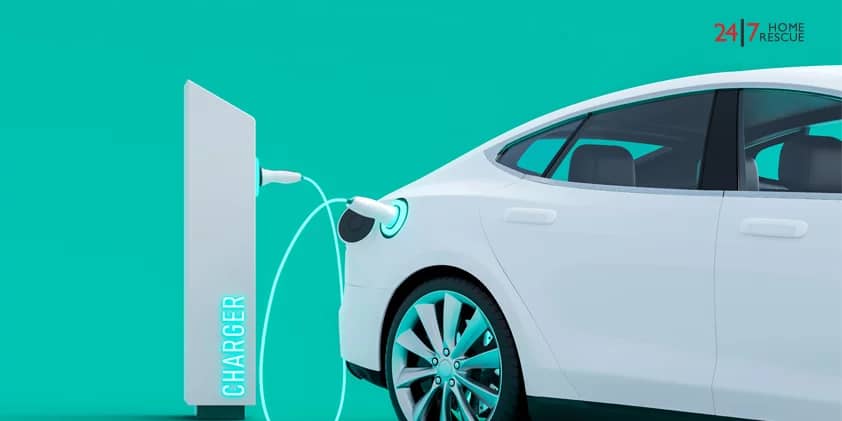
The recent announcement by the Antigua and Barbuda government to transition its government fleet to electric vehicles (EVs) has sparked a range of opinions from residents, reflecting a mix of excitement, skepticism, and practical concerns.
One resident, voicing a common sentiment, questions, “To drive on what roads??”
This concern underscores the longstanding issue of road conditions in the country, emphasizing the need for infrastructure development alongside the adoption of EVs.
Another resident wisely points out the necessity for advancements in battery technology, stating, “The technology needs to be in place for a long life battery before I’d buy an electric car.”
This highlights the importance of reliable and durable EV technology for widespread acceptance.
The mention of power cuts raises valid concerns, with one resident questioning, “What about de power~cut?”
Indeed, the success of an EV initiative is contingent on a stable and efficient power supply, prompting a broader discussion about the country’s energy infrastructure.
Addressing the water situation, a resident emphasizes, “My humble opinion is that they should fix these problems,” calling attention to critical issues like water scarcity that demand urgent attention.

Criticism about the environmental impact of electric vehicle batteries is evident in a resident’s statement: “Do you have any idea what it cost the environment to produce the batteries for electric cars, which have a life span of approximately 10 years?”
This quote highlights the importance of considering the entire lifecycle of EVs, including production and disposal.
The skepticism continues with a resident cautioning against blindly embracing the hype: “Don’t believe the hype on electric vehicles, they still have a long way to go with this technology!”
Acknowledging that EV technology is evolving, the resident encourages a realistic perspective on its current capabilities.
A call for prioritizing essential needs over technological advancements is expressed in the sentiment, “Electric car my *ss, State of our roads a hovercraft would be the best idea….”
This reflects the view that addressing immediate challenges, such as road conditions, should be a priority.
Residents say the government must not only champion EVs but also address the legitimate concerns and priorities voiced by its residents.
Balancing technological progress with practical solutions will be key to ensuring a smooth and successful transition to a greener transportation system.
Advertise with the mоѕt vіѕіtеd nеwѕ ѕіtе іn Antigua!
We offer fully customizable and flexible digital marketing packages.
Contact us at [email protected]
















Just another pie in the sky.
Damn nonsense bout EV. Another way to launder our hard earned tax dollars is what they mean to say.
This is absolute rubbish. Do people ever wonder what powers an EV. Surprise, it’s fossil fuel girls & boys.
However, one of the most disturbing aspects of the government’s promotion regarding Electric Vehicles into Antigua & Barbuda with our poor road, water and electricity infrastructures, is that they couldn’t foresee the furore that was incoming?
What may work for other countries (and even that’s now debatable) may not necessarily work for us here in Antigua.
We are being led by TOTAL incompetence …
I don’t support either government party and firmly believe there are tremendous amounts of issues in our basic infrastructures caused by years of poor governance. Nonetheless, This is the ignorance you post as a news forum?? So we post opinion over factual information? EVs can be powered very successfully via clean energy, EVs share the same suspension as existing combustion vehicles as such the road quality affects them the same way it does combustion vehicles, EVs can also redistribute power, in turn assisting with power balancing in times of need. Though, apparently wouldn’t it be conducive to talk about Electric vehicles and educate on what the benefits and concerns can be?
So we must continue to utilize foreign supplied fuel resources from politically volatile nations bleeding the country of foreign exchange and allowing for continued shady practices? Preparation for such a step is a must, but this is a needed and progressive thing. For a so called educated nation to paint such a negative picture instantly rather than discuss is depressing.. Due to greater efficiency across the board this technology will naturally overtake it’s inefficient fossil fuel counterpart. but this mass mentality is why brain drain is and seemingly will always be a thing.
I respect your point of view on EV’s (and yes, there is a “but” coming), but you’ve not mentioned the amount of natural resources needed to produce these vehicles and the disgusting child labour involved as well.
WHY IGNORE THESE DISTURBING FACTS @ STANLEY?
Are you being intentionally wilful of this actuality?
Correct.
@Stanley Barreto,
What educated nation do you speak of? When referring to Antigua, you will need to truly understand the mindset of locals.
They do not want to learn, no innovations, merit means nothing, and ignorantly is the best way to live in Antigua
EVs are a scam which have a very large carbon footprint.
Do we have trained technicians to service these vehicles? Maybe by then we will. How about ensuring reliable electricity first.
So after 10 minutes of google searching, this is my opinion.
Correct me if I’m wrong but it might be worth it in the long run. Most people spend $100.00 – $150.00 per week for gasoline/diesel. So, if we do the math’s, that’s roughly $400.00-$600.00 per month. A EV vehicle on average may give you 200 – 500 miles distance. Most EV vehicle has an average battery capacity of 40kWh (some as high as 100 kWh). Basic on APUA electricity rate:
Consumption Charge*: $0.40 cents per unit (kWh) up to 300 kWh; $0.38 cents per unit (kWh) over 300 kWh (Apua website)
So, let’s say an EV vehicle has a battery capacity of 50kWh and you charge it 3 times per week, that’s a total of 600kWh per month. 600 x 0.38 = $228.00
So that’s roughly $250.00 added to your electrical bill which is still less than paying $400.00 on fuel.
Doesn’t sound bad to me. The only issue I see is the charging voltage:
Level 1 dry cell can be charged on 120 volts, but Level 2 DC fast charging requires 480 volts, and as we know, transformers automatically increase your bill by $100.00.
I say remove the restriction on solar power restrictions and more people would jump at the idea.
Plus, why isn’t Environmental Department no speaking up and explain this properly to people?????
@Random Guy December 11, 2023 At 2:40 pm
The Department of Environment have done many public education on the introduction of these EV. And one point when they gave the Minister Sir Molwyn Joseph a Tesla, all hell broke lose on the UPP side. Even when it was explained to them that he was just taking part of a test project.
The company that is introducing EV in Antigua is Mega Power. My friend Lucien Baretto’s son I believe he is.
https://megapowerantigua.com/
This is their website.
Sorry to say but the UPP is always here trying to dumb down the people. It’s a good thing that you are doing your own research. And remember the introduction is first going to be for Government Vehicle. That is one way of lowering the expense budget.
Every time this guy Brix opens his mouth just to criticize this government, only because he hates our prime minister, he removes all doubt in everyone’s mind as to his incapability to be rational. The car manufacturers have been given a timeline by the big industrial countries to start transitioning out the combustion engines vehicles. Of course this will take some years. But we cannot wait for it to suddenly happen. So many countries are slowly transitioning their vehicle fleet. Our government as front runner in the fight against climate change have pledge to start the transition with the government controlled fleet. We have seen many such test vehicles on the road already. And it baffles me that we have so many stupid people on the UPP side. To link the introduction of electric vehicles with the road conditions. What does one has to do with the other. I can understand that that our electrical grid is not ready yet, but that is why it is not introduced for all vehicles. Just government vehicles. And in his speech the Governor General has indicated that charging stations, that will run on Solar Power will be installed at strategic places. Presently you have charging stations at the SVRS and at the D.O.E. I guess WIOC will be ask to introduce charging stations all over the place. Particularly in parking lots. In Europe in the city and all over the place their are charging stations when you park your car. If you are not going to use the charger you cannot park their. And you pay by credit card or with an app that you download to your phone. I’d say this transition will take at least forty years and then the oil companies will have to find other ways to make money. But then again these trillion dollar companies won’t give up on oil that easy. Perhaps they will stop the sun from shining so that we must used oil in order to produce energy. I mean who knows how this will end. I, for sure, won’t be around to see that. All I know that my generation was afraid of the introduction of nuclear energy. And today you hear nothing about it. But in many cities, electricity is being provided by nuclear power plants. We are going with LNG. Much cleaner than diesel.
So child ‘slave’ labour to supply the minerals/resources to ensure that uneconomical development of EV’S in Antigua & Barbuda – and around the globe – is ok with the likes of you then @ From The Sideline.
Has your Dunning-Kruger symptoms returned once more?
SEEMS SO … 😁
Oh, and by the way Sidey, I didn’t even mention your God ‘Gaston Browne’. I was talking about the DESTRUCTIVE developments of Electric Vehicles, you dumb as#@.
TRY HARDER SIDEY … YOU CAN DO IT! 😉
http://therapist.com/behaviours/dunning-kruger-effect/
Toyota, the biggest car maker in the world have declined to make all electric vehicles. Toyota argue that they are impractical and there isn’t the infrastructure to support their adoption now or in the foreseeable future.
EVs are at best a niche market. But overall they are an expensive, polluting scam. The resources and environmental mess involved in their production is huge.
EV’s will never be a long term solution. When a battery’s life is over in ANU the car is finished. The most expensive part of an EV is the battery, replacing one in ANU will financially feasible. Then what happens to the expired battery, it goes into a landfill.
Comments are closed.